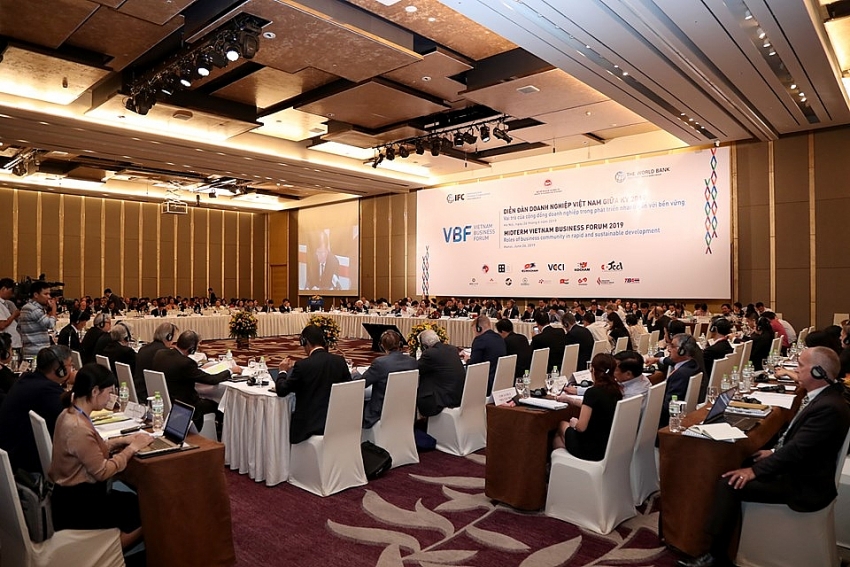Role of business community in rapid and sustainable development
 |
| The mid-term VBF 2019 discussed the role of the business community in achieving rapid and sustainable development in Vietnam |
The mid-term Vietnam Business Forum (VBF) 2019 today (June 26) was held by the Ministry of Planning and Investment in collaboration with the World Bank, International Finance Corporation (IFC), and VBF Consortium, with the theme of “Role of business community in rapid and sustainable development".
Vietnam is an attractive destination for domestic and foreign investors, especially as global trade tensions keep on. Vietnam could seize the opportunities from the transformation of manufacturing facilities. Thereby, improving the investment and business climate is one of the most important factors to take advantage of all opportunities coming the country's way.
Most comments at the mid-term VBF 2019 highlighted these points. The European Chamber of Commerce (EuroCham) hoped to remove all unclear and unnecessary business conditions in the next quarter, in accordance with Resolution No.02/NQ-CP, while the American Chamber of Commerce in Vietnam (AmCham) wishes to see higher standards of business, as well as ensure equal opportunities and fairness for all.
The Korea Chamber of Business in Vietnam (KoCham) expressed concern about the delays in granting investment certificates for some projects in Ho Chi Minh City and the progress of infrastructure improvements. Meanwhile, the Japanese Chamber of Commerce and Industry in Vietnam (JCCI) said that the change in laws or regulations will disturb stable business operations, hence it will increase back office cost, leading to difficulties in enterprise establishment, and expressed the need for more predictability in business.
For the past two decades, Vietnam’s competitive position was based on low labour costs and attractive demographics that offset the many regulatory burdens investors faced. Recently, labour costs have outpaced productivity gains which hurts the country’s competitive position.
In the time coming, Vietnam wants not only to increase productivity and the quality of investment capital, as well as take advantage of opportunities from free trade agreements, but also to become a hub attracting resources into innovation and the science-technology sector.
“We highlight the importance of the improvement of the business climate for the rapid and sustainable development of the private sector, and expectations for investment by private enterprises and how their role is growing in Vietnam. The improvement of the business climate will encourage private investment, which will contribute to the further development of Vietnam,” Nobufumi Miura, chairman of JCCI, commented at the mid-term VBF 2019.
The business community said that Vietnam could be more attractive if it ensured the fairness of legal provisions and facilitated expansion to international markets. Amanda Rasmussen, chairwoman of Amcham, emphasised, “Creating an environment that encourages innovation is vital for Vietnam’s future.” Science and technology are areas of great opportunity that require forwarding-thinking policy approaches, but in fact, there are many troubles to face.
The Investment and Trade Working Group of VBF raised recommendations about fintech and peer-to-peer (P2P) lending. While fintech is growing rapidly in Southeast Asia, the lack of regulatory guidance has made it more difficult for businesses to navigate this industry in Vietnam. No specific business line for P2P lending services exists and businesses are not clear on which business line they should register P2P lending services under in Vietnam.
“We have seen businesses register other business lines to provide P2P lending services, and risk being non-compliant with their business license by operating a service that is not covered by their business license,” the working group stated.
They also recommended that the government reconsider restricting foreign ownership in fintech companies, as it may handicap the growth of fintech in Vietnam, as well as the investment-attracted capability.
VBF associate members also commented about technology transfer as one of the most important factors for a good business environment in Vietnam. In reality, the 2017 Law on Technology and Decree No.76/2018 have a heavy-handed approach to technology transfer.
Specifically, the overly broad registration requirements hinder investments by delaying technology transfer processes and hampering the execution of technology transfer agreements. Some investors will be sufficiently deterred by the confidentiality risks posed by registration, to the point that they may forego their entire investment in Vietnam.
In fact, investors are expecting new trends and new platforms of digital economy, aimed to significantly reduce costs, supply products and services to much more customers, as well as easily approach new and sizeable markets.
“We advocate for the critical improvements necessary to allow the flow of technology and science to continue Vietnam’s opportunities for sustainable growth,” Rasmussen commented.
What the stars mean:
★ Poor ★ ★ Promising ★★★ Good ★★★★ Very good ★★★★★ Exceptional
 Tag:
Tag:
Related Contents
Latest News
More News
- Japanese business outlook in Vietnam turns more optimistic (January 28, 2026 | 09:54)
- Foreign leaders extend congratulations to Party General Secretary To Lam (January 25, 2026 | 10:01)
- 14th National Party Congress wraps up with success (January 25, 2026 | 09:49)
- Congratulations from VFF Central Committee's int’l partners to 14th National Party Congress (January 25, 2026 | 09:46)
- 14th Party Central Committee unanimously elects To Lam as General Secretary (January 23, 2026 | 16:22)
- Worldwide congratulations underscore confidence in Vietnam’s 14th Party Congress (January 23, 2026 | 09:02)
- Political parties, organisations, int’l friends send congratulations to 14th National Party Congress (January 22, 2026 | 09:33)
- Press release on second working day of 14th National Party Congress (January 22, 2026 | 09:19)
- 14th National Party Congress: Japanese media highlight Vietnam’s growth targets (January 21, 2026 | 09:46)
- 14th National Party Congress: Driving force for Vietnam to continue renewal, innovation, breakthroughs (January 21, 2026 | 09:42)




























 Mobile Version
Mobile Version